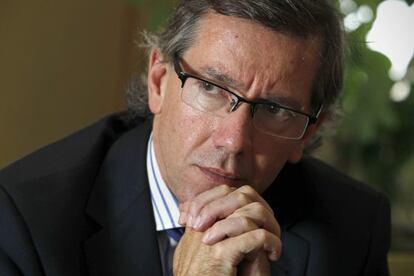“Egypt must not fall to extremists,” says EU special envoy Bernardino León
Special representative talks about European response to violence sweeping the country

The European Union's special representative for the Southern Mediterranean, Spaniard Bernardino León, says that he foresaw a difficult summer, but that events have proved more complicated than expected as result of what the EU calls the "military intervention" in Egypt and the ensuing violence that has left an estimated 900 people dead. León talked to EL PAÍS earlier this week, ahead of the EU emergency meeting that saw Brussels suspend licenses for arms exports to Egypt. Last November the EU pledged a five-billion-euro aid package for Egypt. It consists of one billion directly from the EU, with the rest to come from the EU-associated European Investment Bank and European Bank for Reconstruction and Development. But most is already frozen because of EU concerns about corruption in Egypt. The EU says it has sent about 450m euros to Egypt in the last three years.
Question. How much influence does the EU have in Egypt?
Answer. A lot. The EU is an important mediator, seen by all in the region as impartial. We are also Egypt's most important trading partner, and provide around 80 percent of the country's tourists. Most of the aid we provide is non-military.
Q. Saudi Arabia has said that it will fill the gap left by any aid cut to Egypt. Are you afraid that this will weaken your position?
A. The problem is that despite all the aid Egypt has received, its economy is still not recovering. It needs investors to return. This is why Europe believes that Egypt has to win back the international investment community's confidence.
Q. Do you really think that Egypt can win the trust of the international community?
A. The situation is serious. The EU has condemned in the strongest terms what has happened, and largely blames the government. But we have also said that both sides have committed acts of violence. We all agree that the key thing now is to return to the negotiating table.
Q. The EU says that there are moderates on both sides, but it is clear that they are not in control of things. How can the moderates be given a voice and a role?
A. If we can get talks going, then these voices will be heard and they will have their say. There are initiatives, we are in contact with many groups, and we are going to make sure that they are heard. We cannot let such an important country fall into the hands of extremists.
Q. Why is the EU so reluctant to call what happened a coup?
A. Because what happened between June 30 and July 3 was much more complicated than a simple military intervention. We have never denied that there was a military element to this. But there were also hundreds of thousands, if not millions, of people on the streets and the real threat of confrontation between different sides. The international community was encouraging President Morsi to find a way out, either through early elections or a referendum.
Q. The impression has been that the EU has preferred to look the other way because it didn't regard the Morsi government as an ally, and as a result things are now much worse.
A. After the elections, the EU recognized Morsi as the winner. Brussels agreed on a 5.5-billion aid package. You can't accuse the EU of ignoring Egypt. But at the end of November, Morsi started to take decisions that we disagreed with: he assumed greater powers, did not include all sectors of society in writing a new Constitution, and generally kept more and more power for himself.
Q. So what happened on July 3 was not a military coup?
A. Let's not get involved in a war of labels or legitimacy, because all we want is a return to democracy, and this is clearly not happening at the moment. We want to see a transition that is inclusive of all parties, with no political prisoners, and respect for human rights. You cannot reproach the EU for having been ambiguous in its assessment of the situation in Egypt.
Q. What would the EU do if the Muslim Brotherhood were banned?
A. This would require a debate within the EU, but personally I think it would be a mistake. It is not possible to demonize an institution that represents so many people, even if it has made mistakes.
Q. Is Egypt on the brink of civil war?
A. No. The government and the Muslim Brotherhood still believe that there is a peaceful solution to this. We are a long way from that, but it is important to stop the spiral of violence.
Tu suscripción se está usando en otro dispositivo
¿Quieres añadir otro usuario a tu suscripción?
Si continúas leyendo en este dispositivo, no se podrá leer en el otro.
FlechaTu suscripción se está usando en otro dispositivo y solo puedes acceder a EL PAÍS desde un dispositivo a la vez.
Si quieres compartir tu cuenta, cambia tu suscripción a la modalidad Premium, así podrás añadir otro usuario. Cada uno accederá con su propia cuenta de email, lo que os permitirá personalizar vuestra experiencia en EL PAÍS.
¿Tienes una suscripción de empresa? Accede aquí para contratar más cuentas.
En el caso de no saber quién está usando tu cuenta, te recomendamos cambiar tu contraseña aquí.
Si decides continuar compartiendo tu cuenta, este mensaje se mostrará en tu dispositivo y en el de la otra persona que está usando tu cuenta de forma indefinida, afectando a tu experiencia de lectura. Puedes consultar aquí los términos y condiciones de la suscripción digital.








































